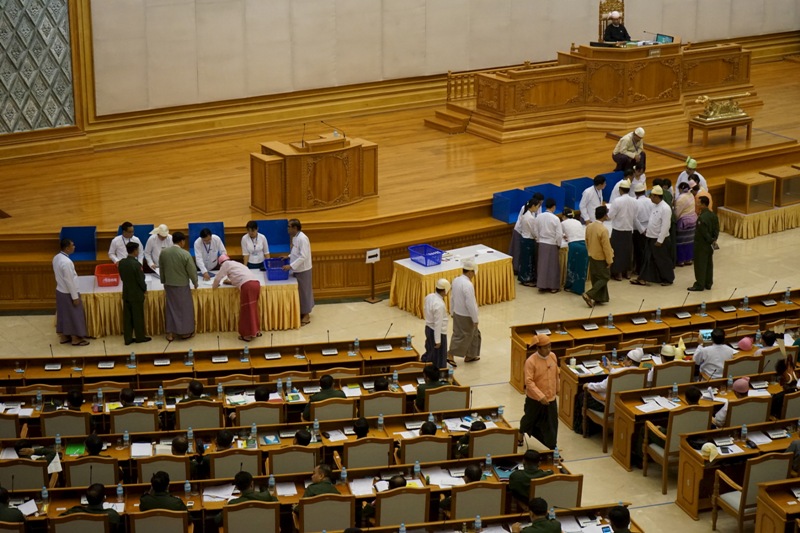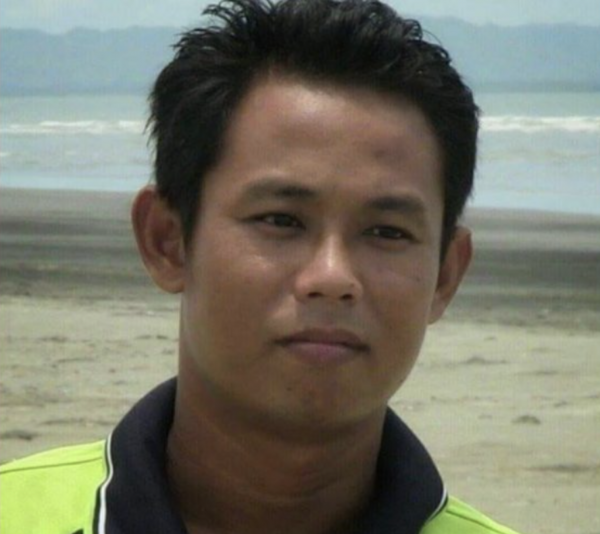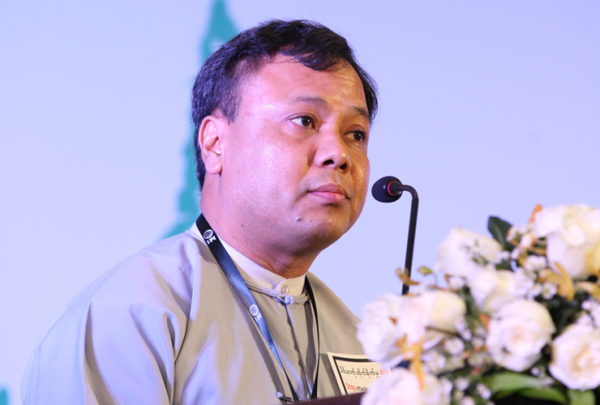Despite its ongoing transition toward democracy, Myanmar took a step backward in terms of media freedom last week when a court officially closed its investigation into the murky death of a freelance journalist killed in October 2014 while in military custody.
A civilian court determined that Ko Par Gyi – also known as Aung Kyaw Naing, who was arrested last September while reporting on conflict between Myanmar’s military and the rebel group Democratic Karen Benevolent Army (DKBA) near the Thai border – died of a gunshot wound.
However, the court did not name anyone responsible for the journalist’s death. The move was particularly troubling given claims by the lawyer of Ko Par Gyi’s wife, Ma Thandar, that forensics reports showed his body displaying signs of torture.
The civilian inquest into the journalist’s death and the months-long search for answers sparked international attention and widespread criticism for a lack of transparency.
Last November, a military court acquitted the two soldiers accused of killing Ko Par Gyi. But the news did not become public until some six months later, when the Myanmar National Human Rights Commission announced it in a May 8 press release.
“It was extrajudicial killing by the military,” Soe Myint, editor-in-chief of Myanmar multimedia news organisation Mizzima Media, said. “But the military is judicially so strong, that there are even few activists taking up the issue.”
No one was charged during the civilian inquest and Dutch freelance journalist Yola Verbruggen, who has been covering the case, told IPI that the investigation seemed “rather pointless”.
Ma Thandar has said she plans to appeal the court’s decision with the help of her lawyer, Robert San Aung. But Soe Myint told IPI he believes the outcome of the case is unlikely to be in Ma Thandar’s favour.
“I don’t expect that she and her family will get the fair judgment from any court,” he said. “But it is brave enough for her and her family to continue to fight.”
Press freedom on the line
Since the official end of direct military rule in 2011, Myanmar has seen radical media reform, such as the release of imprisoned journalists, the elimination of pre-publication censorship and the opening of electronic and print media competition.
However, incidents of government harassment and intimidation of the media have increased this past year as the Southeast Asian country approaches crucial national elections set for November.
Earlier this month, Amnesty International released an extensive report highlighting the escalating restrictions on media workers. In “Caught Between State Censorship and Self-Censorship: Prosecution and Intimidation of Media Workers in Myanmar”, the group criticised the government for stifling journalists’ ability to carry out their work.
According to the report, journalists who are critical of the government or who cover sensitive subjects often face increased harassment, intimidation, imprisonment and greater restrictions of information.
Amnesty reported that at least 11 media workers were imprisoned in relation to their work in 2014 and that at least 10 journalists are currently imprisoned. Many other journalists reported direct death threats, surveillance and the use of defamation suits to hinder reporting.
This month, Myanmar’s Ministry of Information brought a contempt-of-court action against 17 senior members of the Daily Eleven newspaper’s editorial team. The case stems from the newspaper’s coverage of a previous court case in which it is accused of defaming the ministry by alleging that it purchased a state-owned newspaper’s press at an inflated price.
Aye Aye Win, an internationally renowned Myanmar journalist and Associated Press correspondent, told IPI that there is a concern among journalists over what they perceive to be an increase in intimidation.
“A whole group of editors being sued is going to be a big problem [for] the existence of that newspaper,” she said. “It definitely will affect their work.”
Aye Aye Win said there is “no doubt” that there is media freedom in Myanmar. But, she continued: “When it comes to the freedom of information and access to information, it’s still very difficult.”
The journalists caught up in the contempt proceeding face up to six months in prison as well as an approximately €81 fine if convicted.
Critics say legal actions such as this are examples of intimidation of the press by using the law to silence the media. However, it is one of many threats to press freedom journalists in Myanmar have faced this year.
On May 31, Myanmar’s navy blocked journalists from approaching a remote island where more than 700 migrants were said to be held. Reporters from Reuters and other foreign journalists were questioned, and some were forced to delete pictures and videos by authorities before being ordered to turn back. Just days later, reporters were temporarily barred from entering Parliament on June 2 after some journalists used social media to post photos of MPs sleeping during sessions.
In July 2014, a court sentenced five journalists from Unity newspaper to 10 years in prison, a sentence that was later reduced to seven years after publishing an article about an alleged secret chemical weapons factory in Magwe Region, central Myanmar. The newspaper has since shut down and all five media workers remain in prison.
Verbruggen told IPI the case illustrates how press freedom remains subject to restriction.
“It’s just a way for the government to show how much they actually are still in charge,” she said. “And the only reason it seems that we can report is because they let us. And if one day they decide we can’t anymore, that is still very easy for them to do this.”
Crisis: the plight of the Rohingya
Religious tensions also remain high in Myanmar between the country’s Buddhist majority and its Muslim minority, as highlighted by the ongoing Rohingya crisis. Myanmar’s government refuses to recognise the officially stateless Rohingya Muslims, denying them basic rights and referring to the group as Bengalis. The minority group has faced decades of persecution, but continues to seek refuge, despite facing violence, poverty, abuse, torture and other human rights violations.
Journalists say the government is particularly sensitive to issues such the migrant crisis and the upcoming elections, causing some reporters to practice self-censorship.
“It seems like intimidation is increasing, so this is going to increase self-censorship,” Verbruggen said. “But also, it’s limiting press freedom because also access is being denied often.”
Despite the transition toward democracy, Soe Myint told IPI there is still “a huge distrust” between the government and the media.
“That didn’t happen in 2012, that didn’t happen in 2013,” he said. “I think it is a very much concern lately that journalists have been imprisoned for what they wrote in print. But we are writing what we want to write.”
Soe Myint said that access to information also remains difficult for Mizzima reporters and other media organisations, as well as for foreign journalists.
“[Journalists] have become more aware, in fact, of the limitations and challenges that they continue to struggle against,” he commented. “One of the challenges for us is access to information that we don’t really have when it comes to the ministries or the military.”
IPI reached out to representatives of the Ministry of Information seeking comment on the concerns raised, but the Ministry did not specifically respond to those concerns.
Looking ahead: elections
As the country prepares to go to the polls later this year, many regard the outcome of the elections as a true test of democracy’s success in the nation.
Soe Myint said he is working hard to prepare his staff for election coverage via a series of trainings.
“We are preparing for that, but we can also expect some violence during, before and after the elections in some pockets of the country,” he predicted.
Since 2010, when pro-democracy leader and Nobel Peace Prize laureate Aung San Suu Kyi was released from house arrest, Myanmar has established its National Human Rights Commission and more than 200 political prisoners have been granted general amnesties.
But in another troubling move away from reform, Myanmar’s Parliament last week voted against several constitutional amendments, ensuring that the military’s power to veto legislation on key issues – and a ban that currently prevents Aung San Suu Kyi of the National League for Democracy from becoming president – both remain intact.
In order to pass, the amendments needed support from 75 percent of Parliament. But that threshold is difficult to reach without support from MPs who are members of the military, which by law holds a quarter of seats.
IPI Director of Advocacy and Communication Steven M. Ellis said that while the group was concerned by the apparent moves backwards, it still believed the upcoming elections presented an opportunity for the country to move forward in creating a more free and open media environment.
“While we have seen positive developments in the last year, we also have seen many that are deeply troubling,” he said. “We continue to stand in solidarity with journalists and media organisations in Myanmar and we note that their ability to cover elections freely is an essential element of democracy. We urge the government, as it continues down the path of this ongoing transition, to ensure that this fundamental right is respected.”



